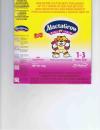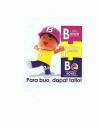Baby Feeding Law Group writes to Mead Johnson about Alactagrow promotion in the Philippines
The Baby Feeding Law Group representing 24 leading health professional and lay organisations in the UK, including the Royal Colleges of Paediatrics, Nursing and Midwifery, has written to the US company Mead Johnson about its irresponsible promotion of Alactagrow in the Philippines.
Stephen Golsby,
President and CEO
Mead Johnson Nutrition
Fourth Floor
2701 Patriot Blvd.
Glenview, IL 60026, USA
Tuesday, June 15, 2010
Dear Stephen Golsby
Marketing of Alactagrow for children 1 year old and above in the Philippines
I am writing on behalf of Baby Milk Action (the UK member of the International Baby Food Action Network)and the Baby Feeding Law Group (BFLG) an ad hoc group of 24 leading health professional and lay
organisations, including the Royal Colleges of Paediatrics, Nursing and Midwifery, working to bring UK and EU legislation in line with UN Resolutions.
In April 2008 the BFLG wrote to the European Commission about our concerns about Mead Johnson’s claims regarding DHA and ARA and over the years we have seen much disturbing evidence about other Mead Johnson promotions of breastmilk substitutes. As you know, the strategies used by your company are in direct contravention of the International Code of Marketing of Breastmilk Substitutes and subsequent relevant World Health Assembly Resolutions and also in contravention of national legislation in many countries. Indeed, the statement highlighted on your international website: “Our mission is to create nutrtional brands and products trusted to give infants and children the best start in life” is a Code violation in itself.
However, in this letter I would like to focus on your company’s promotion of Alactagrow in the Philippines.
As you are aware, the Government of the Philippines requires all products to be registered with the Food & Drug Administration before they can be sold in the market and Mead Johnson has registered a range of milks for infants and young children. However the registration for one product, Alactagrow (for children for 1 year and above) expired on March 28, 2010. Mead Johnson applied for an extension in Feb 15, 2010 but this request was refused because the formulation did not comply with the Codex Standard as adapted by the Philippines. The product was deemed substandard because its fat content is below the recommended level.
Despite this, Mead Johnson continues to market Alactagrow. Worse still it is doing so in violation of the Philippine Code of Marketing of Breast-milk Substitutes (Executive Order 51) in relation to the nutrition and health claim incorporated into the brand name - Alactagrow Bibo Trio, the idealised image of the tiger, and the preparation instructions. Alactagrow is itself an implied claim and although Bibo Trio does not sound like a health claim - it clearly becomes one when it is supported by Mead Johnson’s matching instore promotions. These promote the idea that the B stands for Brain, I for Immunity and B for Bones. As you know, nutrition and health claims are absolutely prohibited for all products sold for children up to 3 years of age.
I would draw your attention to the view of the UK Baby Feeding Law Group which is that if any ingredient is unequivocally demonstrated to be essential, beneficial and SAFE for all those babies who are not breastfed - it should be a mandatory ingredient, pre-authorised and listed in the regulations governing the product. But this safety and efficacy must be demonstrated by an independent review of all data which must include a substantial proportion of independently-funded research.
The UK Scientific Advisory Committee on Nutrition (SACN) has also stated : “We find the case for labelling infant formula or follow on formula with health or nutrition claims entirely unsupportable. If an ingredient is unequivocally beneficial as demonstrated by independent review of scientific data it would be unethical to withhold it for commercial reasons. Rather it should be made a required ingredient of infant formula in order to reduce existing risks associated with artificial feeding. To do otherwise is not in the best interests of children, and fails to recognise the crucial distinction between these products and other foods.”
This principle was endorsed by a World Health Assembly Resolution which was passed last month and called on Member States to end “all forms of inappropriate promotion of foods for infants and young children and that nutrition and health claims should not be permitted on these foods.”
Ricardo Uauy, chair of the WHO/FAO expert committee on fats is also concerned about the use of claims and has given us permission to quote him: “The evidence for effectiveness of DHA addition to formula for term babies in terms of improved long term mental development is weak at best. Data from a population based very large study (n=800) per group recently completed in Mexico does not support a benefit from DHA supplementation on measures of mental development at 18 to 24 months. The studies that demonstrate effects are smaller in numbers and few if any show effects beyond 4 yrs of age. This issue remains open from a research point of view, but until stronger data are available I would opt for a view that the effects of DHA on mental development are not sufficiently documented to establish public health policy. Whether it should be available and used subject to physician and parental choice it is a different story, I would make it available without claims in this regards. Whether a claim that “DHA containing formula is closer to human milk composition”, although factually true it is misleading in terms suggesting it parallels the benefits of human milk feeding.”
Lastly, if this product does eventually get approval from the authorities, the instructions for preparation must be changed. The required notices seem to be present but there is simply no sense in recommending, as you do, that water is boiled for 30 minutes and then left to cool to room temperature before mixing with the powder. The Guidelines to the Law require that labels and any accompanying leaflet provide “Adequate directions for the appropriate preparations and use of the product....” But clearly the intent is that such instructions should be in line with WHO’s clear recommendation that powdered formula should be mixed with boiled water, cooled to no less than 70 degrees centigrade and then cooled to feed the baby.
We urge your company to use the new WHA resolution as an opportunity to bring your policies and practices fully into line with the UN requirements in all countries, to address the problems outlined in this letter and in particular to end the use of all nutrition and health claims in all countries.
Yours sincerely
Patti Rundall, OBE
Policy Director, Baby Milk Action and Secretariat of the Baby Feeding Law Group
cc
Dr. Esperanza I. Cabral, Health Secretary, The Philippines
Dr. Margaret Chan, Director General, WHO ,
Anthony Lake, UNICEF, Executive Director,
Paul Andrew Richards, President, Mead Johnson Nutrition
Attached: Alactagrow label and instore promotions, June 2010
Member organisations: Association of Breastfeeding Mothers - Association for Improvements in the Maternity Services - Association of Radical Midwives- Baby Milk Action - Best Beginnings - Breastfeeding Community - Breastfeeding Network - Caroline Walker Trust - Community Practitioners and Health Visitors’ Association - Food Commission - Heart of Mersey - Lactation Consultants of Great Britain - La Leche League (GB) - Little Angels - Midwives Information and Resource Service - National Childbirth Trust - Royal College of Midwives - Royal College of Nursing - Royal College of Paediatrics and Child Health - The Baby Café - UK Association for Milk Banking - Unicef UK Baby Friendly Initiative - UNISON - Women’s Environmental Network.
| Attachment | Size |
|---|---|
| 2BFLG to Mead Johnson 16.6.10.pdf | 354.4 KB |
- Login to post comments










